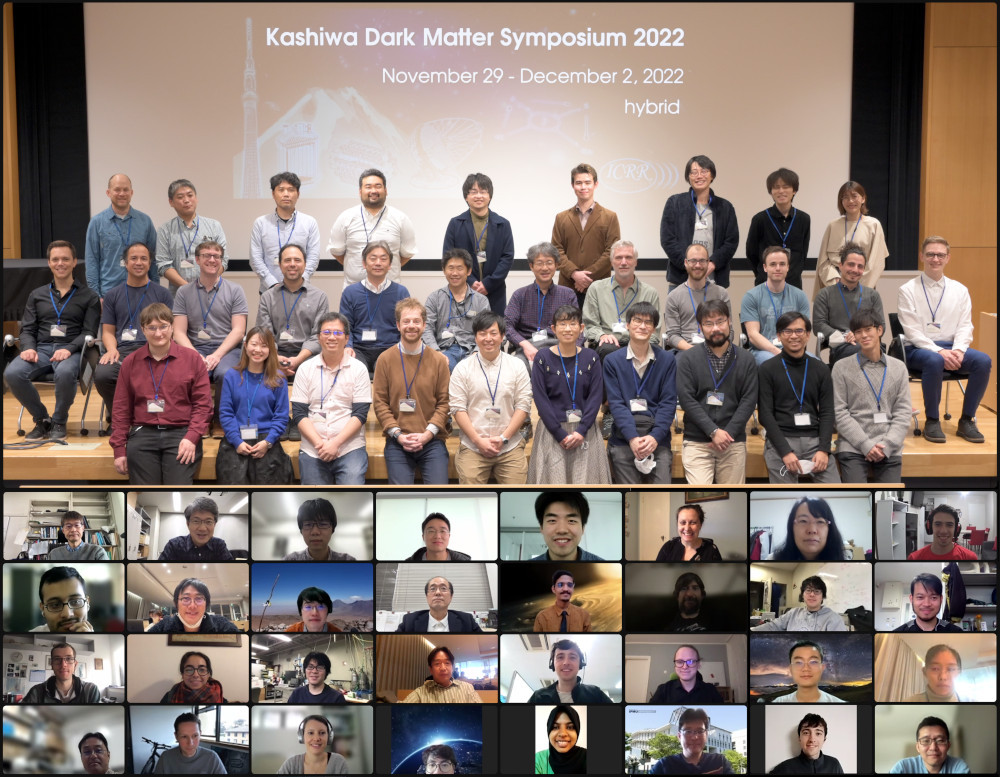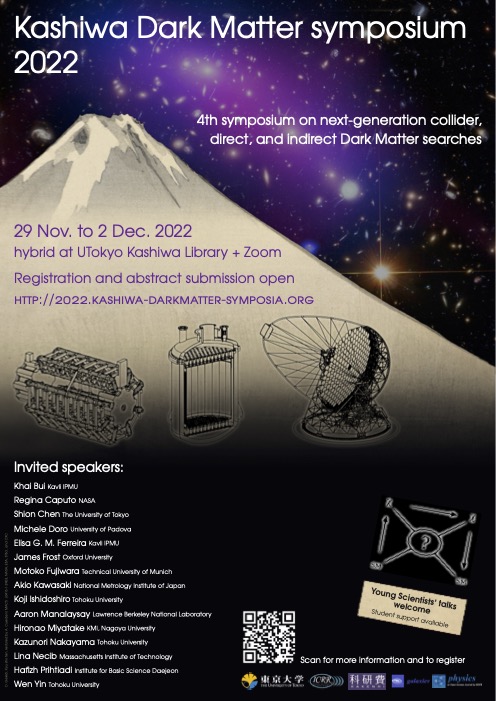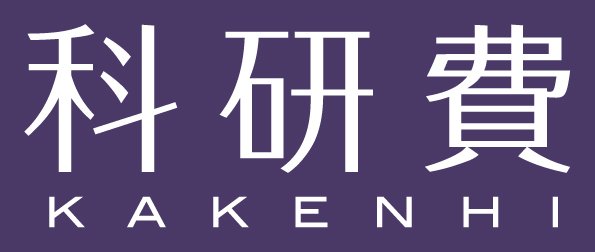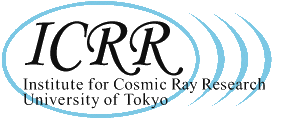
Kashiwa Dark Matter symposium 2022
November 29 - December 2, 2022
hybrid #dm2022kashiwa
Updates

Thanks for your participation and helping organizing the symposium!
20/01: The email address loc@2022.kashiwa-darkmatter-symposia.org is expired. Please contact us via loc@kashiwa-darkmatter-symposia.org instead.
13/12: We would like to thank all speakers, attendees, chairs, and organizers for their contribution to the Kashiwa Dark Matter Symposium 2022.We are happy to announce the winners of this year's prizes for the best contributed oral and poster presentations:
- Robin Fynn Diedrichs (Goethe University Frankfurt) for the best contributed theory oral presentation at the Kashiwa Dark Matter Symposium 2022.
- Moritz Kellermann (Max Planck Institute for Physics) for the best contributed experimental oral presentation at the Kashiwa Dark Matter Symposium 2022 (watch short presentation here).
- Elsa Teixeira (University of Sheffield) for the best theory poster presentation at the Kashiwa Dark Matter Symposium 2022 (watch short presentation here).
- Yuri Kirita (Hiroshima University) for the best experimental poster presentation at the Kashiwa Dark Matter Symposium 2022.
23/11: All participants have received connection details for virtual access via Gather.Town, Zoom, and Slack. Please contact loc@2022.kashiwa-darkmatter-symposia.org in case you did not receive any information.
21/11: Talk schedule and poster abstracts are published.
4/11: The registration is now closed. Thank you all for the registrations with your great interest!
Thanks a lot for all the great abstract submissions! Everybody who has submitted an abstract should have received on Oct. 28 a notification upon oral or poster presentation acceptance. If you did not receive a notification, please contact loc@2022.kashiwa-darkmatter-symposia.org.
WARNING: please ignore spam email from "travellerpoint.org". We have confirmed one email scam targeting participants of the KASHIWA Dark Matter Symposium 2022. The email is from "travellerpoint.org" and possibly looks like the one here. This pretends to ask the recipients to provide their arrival and departure dates for the symposium and to ask credit card details. Please do not reply to the scam email or click on any link in it. If you have received such emails, please contact the organizers of KASHIWA Dark Matter Symposium at loc@2022.kashiwa-darkmatter-symposia.org, the only official email address for the symposium. In general, please ignore all emails regarding KASHIWA DM symposium unless it is from the above address or from someone who you know is an organizer of the conference.
BEST PRESENTATION PRIZES: We are happy to announce that we can offer four prizes sponsored with €250 (¥35000) each for the best experimental and theory talk or poster contributions. The prizes are kindly sponsored by the journals Physics (best theory contributions) and Galaxies (best experimental contributions) by MDPI.
Rationale
We are happy to announce the fourth Kashiwa Dark Matter symposium at the Institute for Cosmic Ray Research of the University of Tokyo. For the first time since 2019, the symposium will take place again in-person at the University of Tokyo Kashiwa Library Media Hall* The symposium will be held fully hybrid, allowing a worldwide inclusive and eco-friendly participation in an ongoing pandemic.
The Kashiwa Dark Matter symposium series brings regularly together international researchers from all relevant experimental and theoretical fields in current and future dark matter searches. This year, the symposium will include a focused session on searches for light Dark Matter from the keV scale down to μeV and beyond, including theoretical aspects and recent developments of detector technologies.
Main Topics:
- Dark matter theory
- Collider experiments for dark matter searches
- Dark matter direct detection experiments
- Dark matter indirect detection experiments
- Astrophysical and cosmological constraints on dark matter
- Searches for light Dark Matter from the keV scale down to μeV and beyond
We encourage especially young researchers and students to attend and to present at the symposium.Application for domestic travel support is open for undergraduate or graduate students submitting an abstract to the symposium. Please apply during registration.
* Depending on the development of the COVID-19 pandemic, the in-person conference part may have to be revisited. Under any circumstance, the in-person conference will be conducted strictly following the guidelines by the University of Tokyo for preventing the spread of COVID-19.
Registration and call for abstracts
Please register here. For on-site participation, a conference fee of 2000¥ is charged in cash at the registration desk. There is no registration fee for online participation. In-person participation is limited on first-come-first-serve basis. As long as the option of in-person participation is available, in-person participation is guaranteed after completing the registration. Entry to Japan will be eased again from October on.
Oral presentations can be given in person or online. Posters will only be presented online, and include a max. 2-minute prerecorded flash-talk. Oral presentations are 10 minutes with 3 minutes Q&A. Applicants for contributed presentations will be notified on October 28, 2022 on the presentation's acceptance.
- Abstract submission deadline: October 21, 2022, 23:59 UTC (closed)
- Registration deadline: November 4, 2022, 23:59 UTC
Invited speakers
- Khai Bui (Kavli IPMU)
- Regina Caputo (NASA)
- Shion Chen (The University of Tokyo)
- Michele Doro (University of Padova)
- Elisa G. M. Ferreira (Kavli IPMU)
- James Frost (Oxford University)
- Motoko Fujiwara (Technical University of Munich)
- Akio Kawasaki (National Metrology Institute of Japan)
- Koji Ishidoshiro (Tohoku University)
- Aaron Manalaysay (Lawrence Berkeley National Laboratory)
- Hironao Miyatake (KMI, Nagoya University)
- Kazunori Nakayama (Tohoku University)
- Lina Necib (Massachusetts Institute of Technology)
- Hafizh Prihtiadi (Institute for Basic Science Daejeon)
- Wen Yin (Tohoku University)
Schedule and on-site venue
The symposium will take place between
- 15:30 and 19:00 JST (6:30 to 10:00 UTC) on Nov. 29
- 9:30 and 19:00 JST (0:30 to 10:00 UTC) on Nov. 30 and Dec. 1
- 9:30 and 13:00 JST (0:30 to 4:00 UTC) on Dec. 2

On-site venue
The on-site symposium will take place at Kashiwa Library Media Hall of the University of Tokyo, Kashiwanoha Campus (5-1-5, Kashiwanoha, Kashiwa-shi, Chiba, 277-8584, Japan).

Scientific Organising Committee:
- Moritz Hütten (ICRR, the University of Tokyo; co-chair)
- Kohei Hayashi (Ichinoseki College/ICRR/Tohoku; co-chair)
- Kento Asai (ICRR, the University of Tokyo)
- Shoji Asai (The University of Tokyo)
- Tobias Binder (Technical University of Munich)
- Elisa G. M. Ferreira (Kavli IPMU, the University of Tokyo)
- Masahiro Ibe (ICRR/Kavli IPMU, the University of Tokyo)
- Shunichi Horigome (Kavli IPMU, the University of Tokyo)
- Masahiro Kawasaki (ICRR/Kavli IPMU, the University of Tokyo)
- Shigeki Matsumoto (Kavli IPMU, the University of Tokyo)
- Kentaro Miuchi (Kobe University)
- Shigetaka Moriyama (ICRR/Kavli IPMU, the University of Tokyo)
- Koji Terashi (The University of Tokyo/CERN)
- Masahiro Teshima (ICRR/Max Planck Institute for Physics)
- Masaki Yamashita (Kavli IPMU, the University of Tokyo)
- Tatsuo Yoshida (Ibaraki University)
Local Organising Committee:
- Kento Asai (ICRR, the University of Tokyo)
- Tobias Binder (Technical University of Munich)
- Kohei Hayashi (Ichinoseki College/ICRR/Tohoku)
- Shunichi Horigome (Kavli IPMU, the University of Tokyo)
- Moritz Hütten (ICRR, the University of Tokyo)
- Midori Sugahara (ICRR, the University of Tokyo)
Equal Opportunities Responsible:
- Shunichi Horigome (Kavli IPMU, the University of Tokyo)
We would also like to warmly thank Stephen Wilkins from the University of Sussex to provide us with a template of the website system.
Poster
Please download and distribute

Code of Conduct
(Adapted from SAZERAC) Attendance at the Kashiwa Dark Matter symposium 2022 is a privilege, and attendees are expected to behave professionally. The symposium organisers are committed to providing an atmosphere that encourages the free expression and exchange of scientific ideas.
By participating in the Kashiwa Dark Matter symposium 2022 as an attendee or presenter, you agree to abide by this code of conduct. Failure to adhere to this code of conduct in all circumstances related to the symposium, including in the online sessions, or any in person, telephone, or other electronic communication, will result in removal from all symposium events.
Our scientific community values all members, regardless of (alphabetically) age, cultural background, disability, ethnicity, gender identity, marital status, nationality, physical appearance, political affiliation, pregnancy, race, religious beliefs, sexual orientation, socio-economic status, and status as a caregiver (including as a parent). The ability to allow our community to share its research results and promote the careers of junior attendees depends critically on maintaining a culture of inclusivity, where all voices are respected and heard.
The symposium organisers will not tolerate verbal, nonverbal harassment or bullying of any kind and will give high priority on eliminating sexual harassment in any form from the workplace. Behavior and language acceptable to one person may not be to another. Members must make every effort to ensure that words and actions communicate respect for others, regardless of opinion regarding the person or their scientific results.
During symposium sessions, the Session Chair is in charge. Speakers must keep to their allotted time, ideally using a timer. If they exceed their time, their question time will be reduced, and if they speak through all of the question time, they will be disconnected. As listener, when asking questions to speakers, please be professional, courteous, and polite. If a participant engages in obvious harassing behavior during the presentations, the Chairs may take any action they deem appropriate, including warning the offender or removing them from the conference.
Participants who believe that they have witnessed or been negatively impacted by a possible violation of the Code of Conduct should contact the Equal Opportunites Responsible by emailing shunichi.horigome@ipmu.jp to initiate a complaint, including any available evidence (e.g., screenshots) in their email. The Equal Opportunites Responsible will treat the appeal at maximum discretion and anonymity when discussing with SOC. If a majority of the SOC concurs that this code has been violated, the offender will be immediately removed from all symposium-related events. The offender will then be contacted by the SOC, and will have the opportunity to appeal the decision. This appeal will be considered by the SOC, whose decision will be final.
Sponsors
- This symposium is supported in part by:
- MEXT Grant-in-Aid for Scientific Research on Innovative Areas:
- Grant-in-Aid for Scientific Research (S):
- Grant-in-Aid for Scientific Research (A):
- Grant-in-Aid for Scientific Research (B):
- Grant-in-Aid for Scientific Research (Early-Carrer Scientiests):
- Grant-in-Aid for Transformative Research Area A (Open-solicited Research):
19H05802 for Shigetaka Moriyama (co-PI, main hosts)
18H05542 for Masahiro Ibe (PI)
17H06131 for Masahiro Teshima (PI, main hosts)
22H00127 for Masaki Yamashita (PI)
20H00153 for Shigeki Matsumoto (co-I)
20H01895 for Shigeki Matsumoto (PI), Kohei Hayashi (co-PI)
21K13909 for Kohei Hayashi (PI)
21H05447 for Kohei Hayashi (PI)
and the grant for ICRR’s Fiscal Year 2022 Inter-University Research Program (PI: Moritz Hütten)



Contact Us
For any questions, please contact loc@2022.kashiwa-darkmatter-symposia.org.